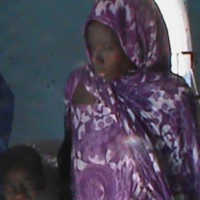
I was the property of four masters from the same family. They shared me, so each one had a period of the year where I was at his service.
I herded their goats from a very young age. But I was never allowed to milk the goats to feed myself or my children. I was only ever allowed to eat the leftovers from the masters’ meals, which I cooked. Sometimes my masters would see me getting ready to eat and they would suddenly confiscate my food. So sometimes my children and I would go for several days without eating.
I never received any money or anything else for the work I did. When I went out with the animals for long periods, my children would remain with the larger family of masters. My 10-year old son became the slave of one of the masters, and was under his control all the time. This meant I never knew that my boy was eating enough, or if he was eating at all.
Now I can hope for a better future. I want to do training that will enable me to set up a profitable business to support my family. All I want is to live a dignified life, and be able to feed and educate my children.
Narrative as told to Anti-Slavery International